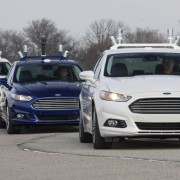Survey: The More Familiar People Become With Driverless Cars, The More They Accept Them
Bobatoo.co.uk
A new survey by insurance advice website Bobatoo.co.uk has found that the attitudes of UK drivers toward driverless cars is beginning to improve.
Bobatoo ran the same survey 18 months ago and found that UK motorists were not too keen on the idea of self-driving cars taking to the roads.
It would seem attitudes are beginning to soften though, as the new survey results show that more UK drivers are looking forward to the prospect of driverless cars.
Of the 2,109 respondents to this latest survey, 34 percent admitted to being “excited” about self-driving cars, a significant increase from the 2015 survey when just 26 percent of respondents said they were “excited.”
A similar change in opinion was evident when respondents were asked if they would prefer a self-driving car over their current car. In 2015, 28 percent said they would rather have a driverless car. That figure has now jumped to 37 percent.
One of the reasons for this apparent change in attitude could be the increase in awareness of self-driving cars among the UK public as a whole. In 2015, more than a third of respondents were not aware that companies like Google and Uber were working on driverless car technology. That figure is down to just 24 percent now, suggesting that the more familiar we become with the technology, the more we accept it.
Revealing the results of the new survey, a spokesman for Bobatoo said, “When the idea of self-driving cars was first mooted by the likes of Google, the main concern among the public was about safety.
“The results of our new survey show that, whilst there is still a long way to go, it would seem that the general public is not only warming to the idea of self-driving cars, they are actively looking forward to them.”
By The Numbers:
A total of 2,109 UK residents were surveyed.
Gender:
Male – 53%
Female – 47%
Age:
17-24 – 12%
25-35 – 28%
35-45 – 21%
45-55 – 27%
55-65 – 8%
65+ – 4%
Do you have a valid U.K. driving license?
Yes – 72%
No – 28%
Are you aware that companies such as Google are currently developing self-driving cars?
Yes – 76%
No – 24%
How do you feel about the development of self-driving cars?
Excited – 34%
Concerned – 28%
Not bothered – 38%
Would you prefer to have a self-driving car instead of your current car?
Yes – 37%
No – 45%
Don’t know – 18%
Image: Rendering of Google driverless car / Credit: Google

